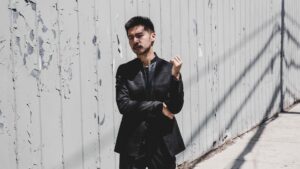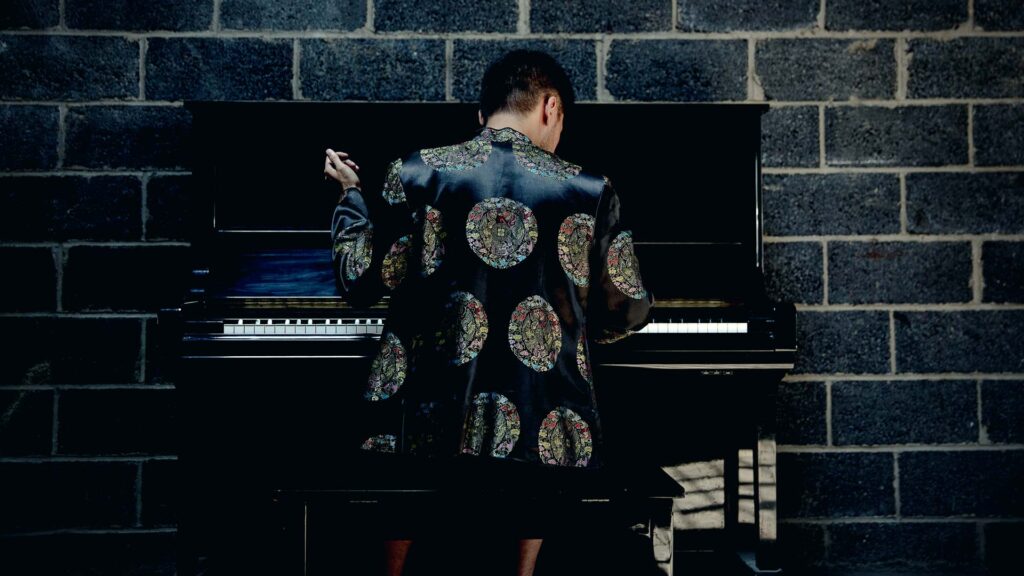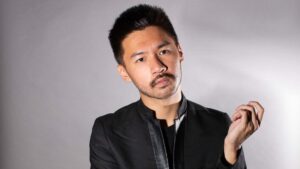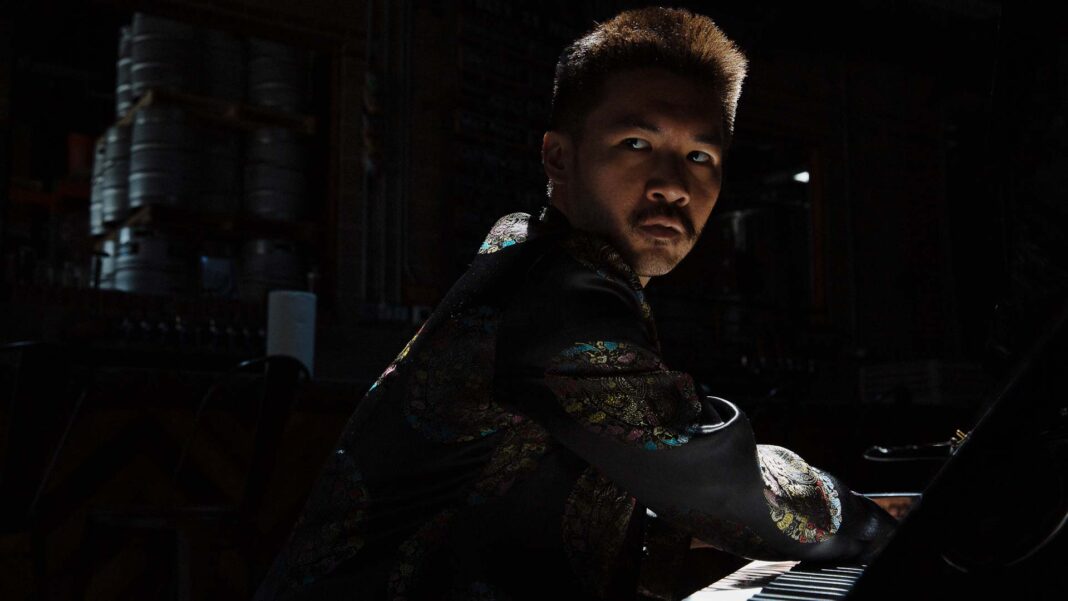Earlier this year Yuja Wang gave a staggering concert at Carnegie Hall to celebrate composer Sergei Rachmaninoff’s 150th birthday. She performed all five majors works for piano and orchestra in a single concert. Pianist/composer Conrad Tao has chosen a different celebration.
On Thursday, April 6th, he will present a recital at The Soraya in Northridge where he will show a through-line from Rachmaninoff to Art Tatum, Billy Strayhorn and Stephen Sondheim. How might he do that? That was just what I wanted to know when I spoke last week with Conrad for the first time since our 2019 interview.

Conrad Tao recorded some of Rachmaninoff’s Preludes for his 2013 album Voyages. He’s also a composer whose work appears on that album as well as on 2015’s Pictures and on 2012’s The Juilliard Sessions.
In our conversation we don’t just cover Rachmaninoff and Sondheim, I ask him an all-important question about one of his favorite shows: RuPaul‘s Drag Race and who he thought would win. Of note, this conversation took place before last Friday’s episode was aired. What follows are excerpts from our conversation that have been edited for length and clarity. To see the full interview, please go to our YouTube channel.
Conrad, you’re someone who embraces a wide range of classical music, whether it is Mozart or contemporary classical music by composers like John Adams and David Lang. Since you’re also not just a musician, but you’re also a composer, what do you appreciate most as a listener and also as a composer and musician when you’re hearing or playing Rachmaninoff’s work?
In some ways, all the same things that everyone else seems to get out of it. Which is, I think, that incredible melodic sensibility first and foremost. For me the two are pretty wrapped up in one another, especially when talking about someone like Rachmaninoff.
Actually the thing that I get excited by is the knowledge that Rachmaninoff himself played the instrument. I haven’t read up on whether or not Rachmaninoff liked to compose at the piano. But I can say, having played a lot of his music, that the music feels remarkably good to play at the instrument; which makes a lot of sense given his virtuosity at the instrument and his prolific reputation as a pianist. But it’s that intimacy, that feeling of connection to Rachmaninoff, potentially, the player has through his composition. Everything I love about the music is filtered through that.
How difficult is Rachmaninoff’s music to play?
It’s hard. I just did the Third Piano Concerto last November for the first time in a little while. There’s no getting around the fact that the piece is quite difficult.
What I’m aspiring to play when I’m playing Rachmaninoff’s music is not really the surface notes at all. The surface notes are just the incidental result of all of the stuff that Rachmaninoff has constructed or is asking me to do, again from underneath. So the music is incredibly challenging because it is so dense, but all of that density actually emerges from a route. As the years have gone by, the challenges have changed.
So what would be the challenge, say, if you were going to do all four of Rachmaninoff’s piano concertos and Variations on a Theme of Paganini all in one concert?
Well, you’ll notice that I was not the pianist doing this concert. My arms might fall off. It sounds kind of fun in the sense that I would love to hear that progression from 1 to 5, five being the Paganini Rhapsody. Unlike, say Beethoven, where all five piano concertos span a decent period, but they don’t span his entire life. The five Rachmaninoff piano and orchestra pieces do actually span his life and his entire career. You’d hear this interesting progression, especially four and five, which are after Rachmaninoff moves to the U.S. I suppose that’s the premise of my program.

The Soraya website says that you’re “speculating about Rachmaninoff in the United States.” How do you define what that statement means in relation to this concert?
Rachmaninoff moved to New York in 1918. Many of his most well-known works were written before then: the Third Piano Concerto; the Second Piano Concerto. Some of his most iconic themes had already been composed before he came to the U.S. We know that he was going to jazz clubs in New York; that he was participating in the musical culture in New York of the 1920s. So we can reasonably assume that he would have been hearing the American Songbook from that time.
We know that he was a fan of Art Tatum, who was early in his career in the twenties. Plus knowing some of the music that he wrote after he moved to the US, which to my ears very clearly evinces the influence of jazz. Although the Rachmaninoff is hardly alone being a composer influenced by jazz. But that was my starting point.
I wanted to explore through Rachmaninoff’s music, as well as music of those that he may have heard when he was in New York and future composers who we know were influenced by Rachmaninoff or may have been influenced by Rachmaninoff, what his influence may have been from and on American jazz and popular music and and songwriting.
What inspired this idea in the first place?
The ask for this program first came into my inbox last spring and I had just happened to see David Lean’s Brief Encounter for the first time with that beautiful Noël Coward script. I was totally unprepared for how beautiful and and formally inventive and emotional it was. The way that it uses Rachmaninoff’s Second Piano Concerto is so fantastic. It’s not quite diegetic, but not quite not diegetic. It’s in this beautiful middle zone where it represents this person’s subconscious in a way, or internal dialogue. It just lit my brain on fire.
Stephen Sondheim’s music is part of your program. You did a transcription of Move On for Anthony de Mare‘s continuing Liaisons project. Last year posted a solo piano version of Sunday [from Sunday in the Park with George] on your Instagram account. How does Sondheim’s work inspire you?
There are so many great things about Sondheim. That’s the wonderful gift that he left us with such a varied output that always has a rich consideration of every note and every word. The way that he’s able to use music to underscore or undercut the words that a character is singing is really like an age-old tradition. Mozart in opera does this as well. It’s just one of the great joys of writing theater music.
The song that’s on this program is In Buddy’s Eyes from Follies. By this point in the [musical], we have enough context to realize that Sally’s trying to console herself or she’s staring into the abyss as she says these words, while also knowing that there’s truth in what she’s singing, too. That complexity you can feel in the harmony, in the pungent chords that occasionally disrupt what is otherwise a placid surface. That’s just one of the great joys of that music.
I first did Sunday as a solo piano encore the night that he passed away. I happened to be working that night and it was really incredible to me how you can perceive all of this drama just in the music. Sondheim is almost a psychedelic experience because there is this endlessly unfolding layers of meaning. It’s addictive.
Since I know you’re a fan and we are down to the final four, who should win RuPaul’s Drag Race and who will win RuPaul’s Drag Race?

I am rooting for Sasha Colby this year in general and I feel like she could comfortably slot into both the should win and will win spots. I have been following Sasha for a little while. I don’t know if you or anyone has seen her winning Miss Continental Talent performance from 2012 but it is fantastic. She’s got really good taste in music and it’s a great pick me up if you’re ever feeling unmotivated or down on yourself. So I love what Sasha is doing. I think she brings such a wonderful perspective to the show.
I also am obsessed with Anetra who is such a great performer. Part of that show is always the painful, honest stories about what it’s like to grow up queer or a queen or anything. Her story is one of the most horrifyingly raw and upsetting ones I’ve ever heard. It stuck with me ever since she told it. So those are my two.
Rachmaninoff said, “The new kind of music seems to create not from the heart, but from the head. Its composer thinks rather than feels. They have not the capacity to make their works exalt – they meditate, protest, analyze, reason, calculate and brood, but they do not exalt.” If you could talk to him composer-to-composer, what would you tell Rachmaninoff about the “new kind of music” being done today?
You know, I have a feeling that we might not totally agree, but that we’d share the same values. I actually really agree that it’s so easy and common for composers to get lost in cleverness. This is actually something the late composer Frederick Rzewski once said. “I think that sometimes people don’t always write music that’s just like the melodies that are going through their heads. And I’m still trying to write the melodies that are going through my head.”
I relate to that. Whatever exalt means to someone, that goal, that desire to communicate something of ones feeling, one’s perspective on the world and one’s being, I suppose. At the risk of being a little fanciful, that is why I do it. So I think that we might have different tastes and I might try to persuade him some experimental work is gesturing towards exaltation as well. That’s what attracts me to various forms of music. What I’m looking for is that feeling of resonance; that feeling of being transported; that feeling of being transfixed. So perhaps exaltation as well.
To see the full interview with Conrad Tao, please go here.
All photos of Conrad Tao by Kevin Condon/Courtesy Unison Media














